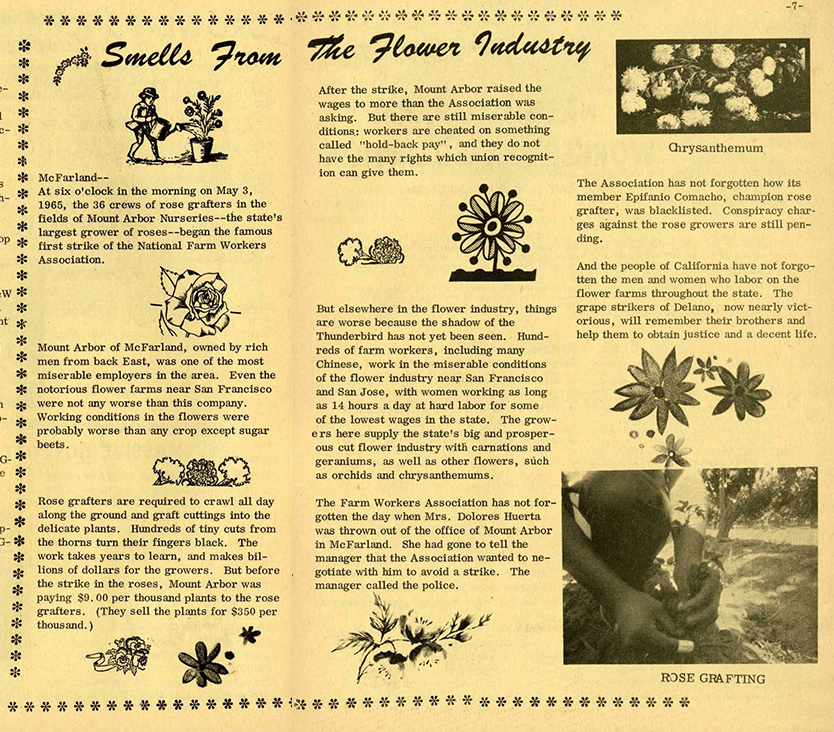Rose Grafters Strike
Rose Grafters Strike
Epifanio Camacho, leader of the rose grafters strike, picketing at a Perelli-Minetti vineyard, Delano, ca. 1966. Photo by Emmon Clarke.
Epifanio Camacho, a skilled rose grafter on Mcfarland who had been blacklisted for fighting against wage theft by his employer at Konklyn Nursery, realized he couldn’t fight alone against the employers. His co-worker and friend, Manuel Rivera told him about César Chávez and the National Farm Workers Association (NFWA) in Delano, just five miles north of MacFarland. Camacho joined the association and organized a meeting of thirty rose grafters from one company, Mt. Arbor, with César Chávez on April 11, 1965. The workers talked about their grievances and asked for help organizing a strike. Rose grafters were highly skilled farmworkers who were difficult to replace, and their work was time-sensitive, which gave them leverage if they decided to walk away.
Manuel Rivera speaking next to César Chávez, Gilbert Padilla, and Larry Itliong at Filipino Hall, Delano, 1966. Photo by Emmon Clarke.
On April 20, the workers agreed to strike two companies—Mount Arbor and Conklin—and they took a strike vote on May 2. The workers stayed at home on Monday, May 3, 1965. For three days, the NFWA leaders, César Chávez, Dolores Huerta, Gilbert Padilla, and Jim Drake, scouted the workers’ homes to make sure that the grafters stayed home. One morning, Dolores Huerta saw lights in a worker’s house making her doubt the word of the striker. So, she blocked the driveway with her truck, locked it, took her key, and left.
On Wednesday night, a group of grafters went to talk to the organizers because a group of foremen had visited them and told them the company accepted the wage demands but refused to sign a contract. The NFWA leaders were divided, with Padilla advocating for holding out for a contract. Instead, Chávez gave the workers his permission to return without a general meeting. By Friday, all workers were back at work with no contract, and within a couple of weeks, all other companies were forced to raise their wages so they wouldn’t lose their skilled workers to Mt. Arbor.

El Malcriado Issue 35, May 5, 1966
An article titled “Smells From the Flower Industry” in El Malcriado Issue 35 from May 5, 1966, details the history of the rose grafters strike in McFarland and highlights the blacklisting of NFWA member Epifanio Camacho.
Tom & Ethel Bradley Center
California State University, Northridge
18111 Nordhoff Street, Northridge, CA 91330
Phone: (818) 677-1200 / Contact Us

